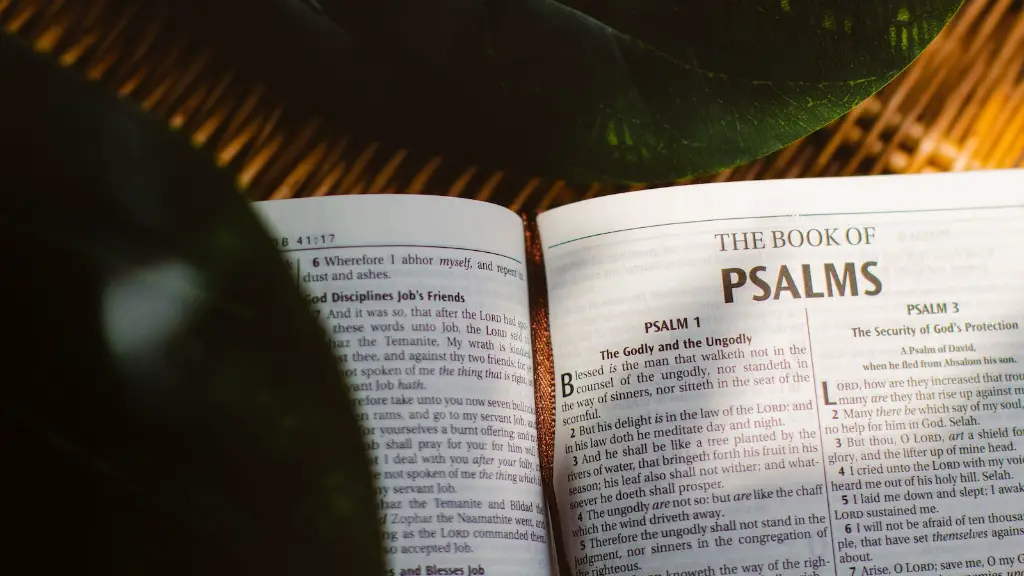Baal is a name found in both the Old Testament and the New Testament. In the Old Testament it is applied to a number of gods or names of gods. In the New Testament, it is a name commonly used to describe the devil or Satan. In the Bible, Baal is depicted as the chief deity of the Canaanite pantheon, a powerful and destructive force of evil. He was worshiped by the ancient Israelites and feared by the ancient pagans, who believed it to be a fearsome power capable of both good and evil.
The term “Baal” is derived from the Semitic root “bēl”, meaning “lord” or “master”. It has been theorized that the Baal of the Bible was actually the Canaanite sky god, Baal Hadad, or the storm god of the ancient Canaanite pantheon. Baal Hadad was usually represented as a figure standing on a mountain, riding in a chariot, or surrounded by bulls. He was believed to be the protector of herds, flocks, and other wild animals.
Within the Bible, the name “Baal” does not always refer to the same deity or being. For example, in the Book of Judges, the term is used to describe a false god, most likely the Phoenician god Baal. In the New Testament, “Baal” is used to refer to Satan or the devil. The name is also used in the Old Testament to refer to false deities that are worshiped by the Israelites during their time in the wilderness.
The name “Baal” is closely linked with the concept of “baalism”, which is a religion centered around the worship of the gods of the Canaanite pantheon. Baalism is closely associated with “Canaanite fertility cults”, which were characterized by orgiastic rituals and human sacrifice. Baalism was widely practiced in the ancient Near East and was a major part of Canaanite culture and religion.
In the Bible, Baal is often used to describe those who are associated with idol worship and unfaithfulness to God. The Bible speaks of the “Baalim” or “Baals” in numerous places. These terms are often used in contrast to terms such as “the Lord” and “God”. For example, in 1 Kings 18:19-20, Elijah challenges the Israelites to “choose whom you will serve…but as for me and my house, we will serve the Lord.”
Today, the term “Baal” is often used to describe those who are demonically influenced and are in opposition to the true God of the Bible. It should be noted, however, that there is no direct evidence that suggests that the original Canaanite deity of Baal is synonymous with Satan. Nevertheless, the term “Baal” is often used to refer to the devil or any other force of evil.
What are Baal Worshipers Like?
Baal worshipers are those who adhere to the Canaanite cult of Baal and its associated rituals. Baal worshipers are believed to have existed since ancient times and have been mentioned in several ancient texts. They are often characterized as being ruthless and using immoral and blasphemous practices in the name of Baal.
Baal worshipers were said to have worshipped idols, engaged in orgiastic rituals, and practiced human and animal sacrifice in order to worship their god. They were often seen as promiscuous, indulging in immoral behavior, and living a reckless lifestyle. The Bible speaks about the corrupt practices of Baal worshipers and their tendency to forsake God for the false promises of their idol.
Today, there are still some who proudly proclaim their adherence to the religion of Baal worshipping. These individuals are often seen as disciples who preach their beliefs in an effort to convert those who have forgotten the original god of the Canaanite pantheon. They are often seen as eccentric and mysterious, often cloaked in mystery and rumors, and are seen by some as comparable to cults.
How Does Baal Worship Affect the Church Today?
Baal worship is still very much alive today and its influence extends beyond the region of Canaan and into modern churches. Despite its largely negative connotations in the Bible, many churches today still incorporate some aspects of Baal worship into their practice, such as using fertility symbols and practicing rituals.
The problem with this is that the blending of pagan and Christian beliefs can give false impressions and lead to the wrong kinds of behavior. The Bible clearly forbids the worship of other gods and idolatry and warns against many practices associated with Baal worshipping.
The good news is that there are many churches and ministries today who are actively working to blend the beliefs of Christianity and paganism in a respectful and meaningful way. By recognizing that both religions share many of the same core values, many churches are finding ways to worship and serve God in a way that honors both belief systems and spiritualities.
Do we Still Worship Baal Today?
Although most people today do not follow a Baal worshipping faith, there are still those who do in some form. As discussed, there are still some who actively participate in rituals and practice associated with the religion of Baal worshipping.
However, Baal worship has largely been replaced by more modern forms of idolatry and false worship. These include the worship of money, fame, pleasure, and material objects of all kinds. Many people turn away from the true God and consequently devote their time, energy, and attention to idols that cannot satisfy or fulfill.
The important thing to remember when it comes to Baal worship is that it is still very much a part of our world today, and it can be easy to become confused or even tempted to participate in practices associated with it. It is essential to stay mindful and prayerful to ensure that our lives are rooted in the true God and not deceived by the false promises that idols can provide.
What Are the Consequences of Baal Worship?
The consequences of Baal worshipping are serious. Not only does it lead to idolatry and the forsaking of God, but it also is associated with activities of immorality and impure lifestyles. This is true because pagans become so focused on worshipping their false god that they lose sight of moral obligations and living a life pleasing to God.
The Bible is filled with warnings and warnings against Baalism, which is indicative of its danger and power. The lesson can be taken from this is how clear and powerful the consequences of turning away from God are. We must remember to cling to the Lord and not be swayed by powers and gods that will only lead us astray.
How Can We Fight Against the Worship of Baal?
The worship of Baal is a temptation that can be avoided by finding strength in God. Reading and studying the Bible will provide an invaluable insight into the teachings of God and the practices of idolatry. We must remember to look to God as our ultimate source of strength and solace and shield ourselves against the deceptions and lies of fallen angels and false gods.
The church can be an incredibly powerful force against the power of Baal. Through prayer, faith, and community, the church can bring people together to wage spiritual warfare against the strongholds of Satan. We can actively fight against Baal worship by resisting any temptation to practice idolatry or immorality and by speaking out against the lies and deceptions of false gods.
Through faith and prayer, we can fight against the powers of Baal. By making God our all in all, we can guard our hearts and minds, resist temptation, and be never swayed by the false promises of a false god.
What Are the Benefits of Worshipping God Instead of Baal?
The most obvious benefit of worshipping God instead of Baal is living a life that is filled with peace, joy, and purpose. Through the power of prayer and faith, God can bring true and lasting change to our lives. When we worship the true God and dedicate ourselves to Him, we are blessed with a life of joy, purpose, and peace.
We also receive God’s care and protection, allowing us to live with confidence in His protection and stewardship. Lastly, when we worship the one true God and stay devoted to Him, we receive His guidance and direction. This can be incredibly helpful in times of difficulty and uncertainty, as we can trust that God is leading us in the right direction.
It is important to remember that the benefit of worshipping God instead of Baal is not just about blessings, but about an eternal salvation. By accepting Jesus into our hearts and dedicating ourselves to His will and Word, we can have an assurance of eternal life in heaven. This is the greatest benefit of all, a reward far greater than any physical or worldly blessing.
What Are the Signs of Baal Worship?
Baal worship is often hard to detect due to its deceptive nature. Some of the activities and practices associated with it include religious ceremonies, idol worship, and orgiastic rituals. It is important to be aware of these activities and to be able to identify them if they become a part of our lives.
Other signs of Baal worship can include a pursuit of material things, living a life of immorality, and a lack of reverence for God. We must remember to be mindful of our actions and activities and to make sure that we are not engaging in any practices that might be seen as idolatrous.
It is also important to be aware of the influences in our lives and understand that some individuals may be promoting Baalism without being aware of it. We should be wary of people and groups who might be engaging in false worship, as well as any spiritual rituals or activities that involve occult symbols or practices.






Excellent article. I would like to share a concern of mine. Hebrew bible, has 7000 verses w God’s name, Jehovah. Only Found 7 times in KJV and NIV. Took out God’s name from His book and uses Lord instead. Baal means “lord.”
What have we done! Bless you